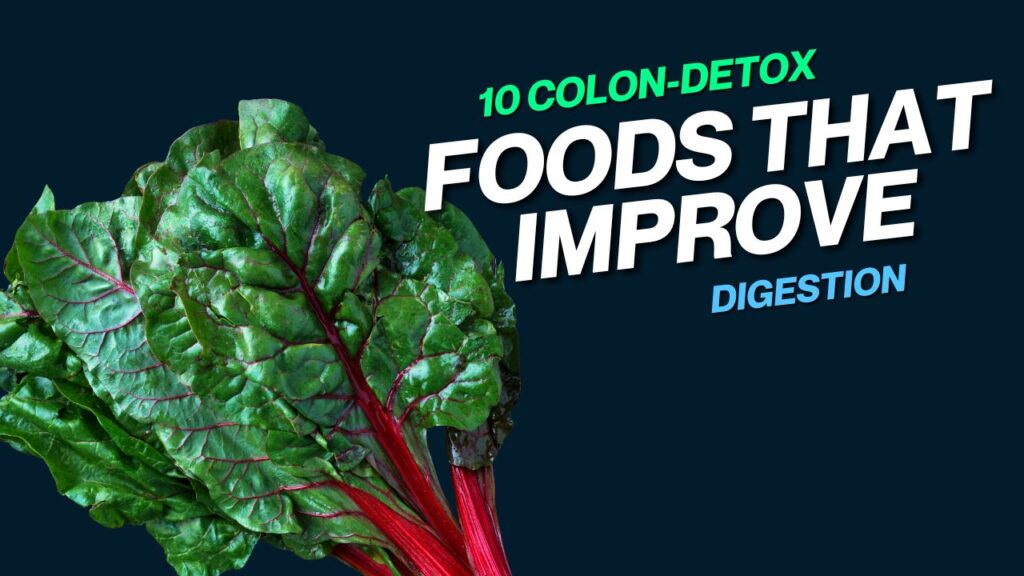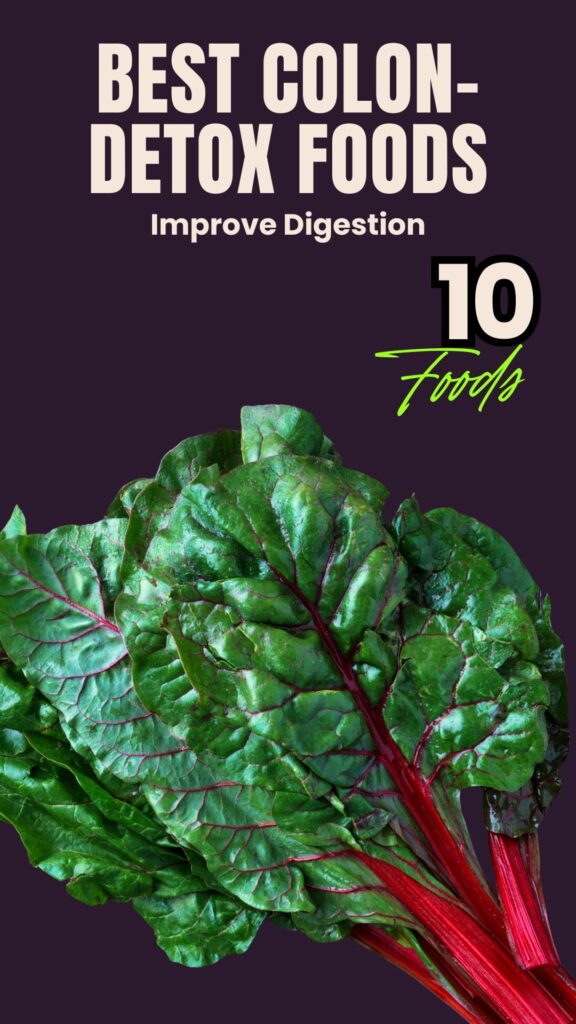Some links in this blog are affiliate links. If you make a purchase through these links, I may receive a small commission. This helps support the site at no extra cost to you.
Did you know that nearly 70% of your immune system is housed in your gut? A healthy digestive tract isn’t just about avoiding bloating or constipation—it’s directly linked to your energy levels, skin health, and even mood.
Yet, modern diets filled with processed foods, sugar, and unhealthy fats often leave the colon clogged, slowing digestion and harming overall health.
That’s where natural colon-detox foods come in. Unlike harsh cleanses or supplements that can sometimes do more harm than good, these whole foods gently support your body’s natural detoxification system. By including them in your diet, you can improve digestion, flush out toxins, and feel lighter and more energized.
In this guide, we’ll explore 10 powerful colon-detox foods, how to use them, who should eat (or avoid) them, storage tips, side effects, and the best ways to enjoy them in your daily meals.

Table of Contents

10 Best Colon-Detox Foods To Eat
1. Leafy Greens (Spinach, Kale, Swiss Chard)
Leafy greens are packed with chlorophyll, which helps cleanse the digestive tract and promote healthy bowel movements. They are also rich in fiber, magnesium, and antioxidants that support colon health.
Best Ways to Eat or Use It
- Add fresh spinach or kale to smoothies.
- Steam lightly and use in salads or side dishes.
- Stir into soups or sauté with garlic and olive oil.
Who Should Eat / Avoid
- Good for: people with sluggish digestion, weight-loss seekers, and those with high cholesterol.
- Avoid/Limit if: you have kidney stones or need to limit oxalates.
Storage & Buying Tips
- Buy crisp, vibrant leaves without yellowing.
- Store in the fridge in a breathable bag with a paper towel to absorb moisture.
Do’s & Don’ts
✅ Do: eat raw or lightly cooked for maximum nutrients.
❌ Don’t: boil too long—this reduces chlorophyll and vitamin C.
Possible Side Effects
Overeating raw kale may cause bloating due to its high fiber and sulfur content.
2. Apples
“An apple a day keeps the doctor away” isn’t just a saying—it’s scientifically true when it comes to digestion. Apples contain pectin, a soluble fiber that acts like a broom in your colon, sweeping out toxins and improving bowel regularity.
Best Ways to Eat or Use It
- Enjoy raw as a snack.
- Blend into smoothies with oats.
- Bake or stew for a warm, gut-friendly dessert.
Who Should Eat / Avoid
- Good for: anyone looking to lower cholesterol, improve digestion, or manage blood sugar.
- Avoid/Limit if: you have fructose intolerance or sensitive teeth.
Storage & Buying Tips
- Pick firm apples with shiny skin.
- Store in the fridge’s crisper drawer to keep them fresh longer.
Do’s & Don’ts
✅ Do: eat with the skin for maximum fiber.
❌ Don’t: peel unless necessary—the skin holds most nutrients.
Possible Side Effects
Excess apple consumption may cause gas in some people.
3. Flaxseeds
Flaxseeds are tiny, but they’re loaded with omega-3 fatty acids and soluble fiber that lubricate the colon and support healthy elimination.
Best Ways to Eat or Use It
- Grind fresh and add to smoothies, oatmeal, or yogurt.
- Mix into homemade bread or pancakes.
- Stir into soups as a thickener.
Who Should Eat / Avoid
- Good for: people with constipation, heart health concerns, or inflammation.
- Avoid/Limit if: you’re on blood thinners or have gut sensitivity to seeds.
Storage & Buying Tips
- Buy whole seeds and grind before use.
- Store in an airtight jar in the fridge to prevent rancidity.
Do’s & Don’ts
✅ Do: grind before eating for maximum absorption.
❌ Don’t: eat large amounts unground—they pass undigested.
Possible Side Effects
High intake may cause bloating or diarrhea.
4. Chia Seeds
Chia seeds expand into a gel-like substance when soaked, helping cleanse the colon and promote hydration.
Best Ways to Eat or Use It
- Soak in water or milk overnight for chia pudding.
- Add to smoothies, yogurt, or oatmeal.
- Use as an egg substitute in baking.
Who Should Eat / Avoid
- Good for: weight-loss seekers, athletes, and people with constipation.
- Avoid/Limit if: you have swallowing difficulties or low blood pressure.
Storage & Buying Tips
- Store in a cool, dry place in a sealed container.
- They last up to 2 years if kept dry.
Do’s & Don’ts
✅ Do: soak before eating for better digestion.
❌ Don’t: eat dry without liquid—they can swell in your throat.
Possible Side Effects
May cause bloating if consumed in excess.
5. Ginger
Used for centuries in traditional medicine, ginger improves digestion by stimulating digestive enzymes and reducing inflammation in the gut.
Best Ways to Eat or Use It
- Brew fresh ginger tea.
- Add grated ginger to stir-fries or soups.
- Blend into smoothies for a spicy kick.
Who Should Eat / Avoid
- Good for: people with nausea, bloating, or indigestion.
- Avoid/Limit if: you’re pregnant (in excess) or on blood-thinning medications.
Storage & Buying Tips
- Choose firm, wrinkle-free roots.
- Store in the fridge wrapped in paper towels.
Do’s & Don’ts
✅ Do: use fresh for maximum benefits.
❌ Don’t: overuse powdered forms—they may lose potency.
Possible Side Effects
Excess ginger may cause heartburn or diarrhea.
6. Beets
Beets are rich in betalains, compounds known for detoxifying the liver and colon. They also increase nitric oxide, which improves blood flow.
Best Ways to Eat or Use It
- Roast with olive oil.
- Juice fresh with carrots and apples.
- Grate raw into salads.
Who Should Eat / Avoid
- Good for: athletes, detox diets, and those with constipation.
- Avoid/Limit if: you have kidney stones (high oxalates).
Storage & Buying Tips
- Pick small, firm beets with fresh greens.
- Store in a cool, dry place or refrigerate.
Do’s & Don’ts
✅ Do: eat both root and greens.
❌ Don’t: discard beet greens—they’re nutrient-rich.
Possible Side Effects
Can cause red urine or stools—completely harmless.
7. Garlic
Garlic acts as a natural antibiotic for the gut, helping reduce harmful bacteria while supporting healthy digestion.
Best Ways to Eat or Use It
- Use raw in dressings and dips.
- Roast whole cloves for a milder flavor.
- Add minced garlic to stir-fries and soups.
Who Should Eat / Avoid
- Good for: boosting immunity and improving gut health.
- Avoid/Limit if: you have acid reflux or sensitive stomach.
Storage & Buying Tips
- Choose firm, dry bulbs without sprouting.
- Store in a cool, dark place.
Do’s & Don’ts
✅ Do: crush garlic and let sit 10 minutes before cooking (activates allicin).
❌ Don’t: store peeled garlic at room temperature—it may grow bacteria.
Possible Side Effects
Too much can cause bad breath, bloating, or stomach irritation.
8. Avocado
Avocados are rich in healthy fats and fiber, making them excellent for keeping the colon lubricated and digestive system running smoothly.
Best Ways to Eat or Use It
- Mash into guacamole.
- Add slices to salads or sandwiches.
- Blend into smoothies for creaminess.
Who Should Eat / Avoid
- Good for: people with constipation, skin issues, or nutrient absorption problems.
- Avoid/Limit if: you’re on a low-potassium diet.
Storage & Buying Tips
- Choose slightly soft avocados that yield to gentle pressure.
- Store unripe ones at room temperature; refrigerate ripe ones.
Do’s & Don’ts
✅ Do: sprinkle with lemon juice to prevent browning.
❌ Don’t: eat overripe avocados—they taste bitter.
Possible Side Effects
May cause allergies in latex-sensitive individuals.
9. Lemons
Lemons stimulate the production of digestive enzymes and help flush toxins from the colon.
Best Ways to Eat or Use It
- Start your day with warm lemon water.
- Use in dressings, marinades, and juices.
- Grate zest for flavor and extra antioxidants.
Who Should Eat / Avoid
- Good for: boosting digestion and liver detox.
- Avoid/Limit if: you have acid reflux or sensitive enamel.
Storage & Buying Tips
- Pick firm, heavy lemons with bright skin.
- Store at room temperature for a week, or refrigerate longer.
Do’s & Don’ts
✅ Do: use fresh lemon juice, not bottled.
❌ Don’t: brush teeth immediately after drinking—it can erode enamel.
Possible Side Effects
Excess may cause enamel erosion or worsen acid reflux.
10. Green Tea
Green tea contains catechins and antioxidants that support colon cleansing and improve metabolism.
Best Ways to Eat or Use It
- Brew as hot tea.
- Use chilled green tea as a base for smoothies.
- Add matcha powder to recipes.
Who Should Eat / Avoid
- Good for: boosting energy, weight-loss seekers, and improving gut health.
- Avoid/Limit if: you’re sensitive to caffeine or have iron deficiency.
Storage & Buying Tips
- Store loose leaves in an airtight container away from light and heat.
- Use within 6 months for best flavor.
Do’s & Don’ts
✅ Do: brew at 80°C (176°F) to preserve catechins.
❌ Don’t: steep too long—it becomes bitter.
Possible Side Effects
Too much may cause insomnia or reduce iron absorption.
Conclusion
Your colon plays a crucial role in overall health, and these 10 detoxifying foods—from leafy greens and apples to ginger and green tea—can naturally improve digestion, flush out toxins, and restore balance to your gut.
By adding just a few of these foods into your daily meals, you’ll notice better energy, improved digestion, and a healthier body overall.
So, the next time you plan your grocery list, include at least one of these colon-friendly foods. Try experimenting with smoothies, salads, teas, and roasted dishes.
What’s your favorite way to enjoy colon-cleansing foods? Share your go-to recipes or tips in the comments below!
Frequently Asked Questions (FAQs)
What is the best natural food to cleanse the colon?
Leafy greens, apples, flaxseeds, and lemons are among the best foods for gently cleansing the colon and improving digestion.
How often should I eat colon-detox foods?
For best results, aim to include at least one or two colon-friendly foods in your daily meals. Consistency is more effective than occasional cleanses.
Can colon-detox foods replace medical treatments?
No. While these foods support digestive health, they do not replace medical treatments. Always consult a doctor for serious digestive or colon-related issues.
Are colon-detox foods safe for everyone?
Most are safe, but people with conditions like kidney stones (avoid beets, spinach), acid reflux (limit lemon, garlic), or seed allergies (chia, flaxseeds) should be cautious.
Do colon-detox foods cause side effects?
Overeating high-fiber foods like flaxseeds, chia, or leafy greens may cause bloating or gas. Start with small amounts and increase gradually.
How long does it take to notice results from colon-detox foods?
Some people feel lighter and experience improved digestion within a few days, but consistent use over weeks shows the best long-term benefits.
Can I drink smoothies for colon detox?
Yes! Smoothies with spinach, apples, chia seeds, and lemon are a great way to combine multiple colon-detox foods in one meal.
Is green tea good for colon cleansing?
Yes, green tea contains antioxidants that support colon cleansing and boost metabolism, but it should be consumed in moderation due to caffeine.
Do I need supplements for colon cleansing if I eat these foods?
Not necessarily. Whole foods provide natural fiber and nutrients that are usually enough for colon health. Supplements should only be taken if recommended by a doctor.
What is the easiest colon-detox food to add to my diet?
Apples and lemons are the simplest—just eat an apple a day or start your morning with warm lemon water.










